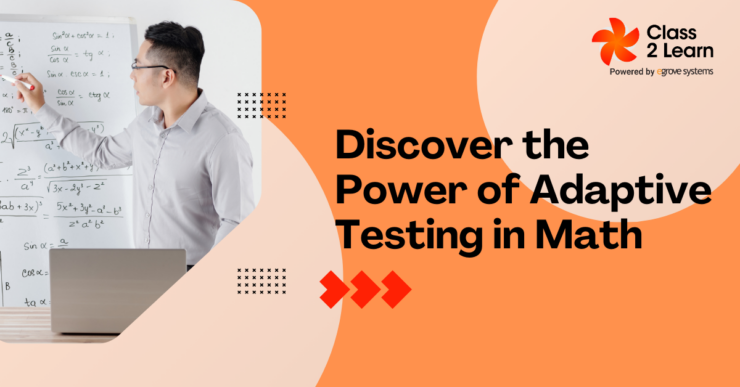Learning is a unique journey for every student. Traditional testing methods often fail to account for the differences in how students learn and apply their knowledge. These tests usually offer the same set of questions to everyone, regardless of individual strengths and weaknesses. This approach can lead to frustration, boredom, or a lack of confidence in students.
However, adaptive testing offers a fresh and innovative solution. It adjusts the difficulty of questions in real time based on how a student answers. This ensures that every test is tailored to the individual’s skill level, making it more engaging and effective.
On our platform, we’ve harnessed the power of adaptive testing specifically for mathematics. Our adaptive math tests are designed to provide students with a personalized and insightful learning experience. Let’s dive deeper into what adaptive testing is, how it works, and the many ways it can benefit students.
What Is Adaptive Testing and How Is It Different?
Adaptive testing is a cutting-edge approach to assessments. It stands out because it personalizes the testing experience for each student. Unlike traditional tests, which have a fixed set of questions, adaptive tests dynamically adjust the difficulty of questions based on the student’s performance.
For example, if a student answers a question correctly, the next question will be slightly harder. Conversely, if they answer incorrectly, the next question will be a bit easier. This ensures that the test remains challenging but not overwhelming.
How Does Adaptive Testing Work?
Adaptive testing uses a sophisticated algorithm to determine which questions to present to students. Here’s a step-by-step breakdown of how it works:
- Starting Point
Every test begins with an easy, medium, or difficult question. This serves as a baseline for the system to gauge the student’s level. - Dynamic Questioning
As the student answers each question, the system evaluates their response. If they answer correctly, the next question will be slightly harder. If they answer incorrectly, the next question will be easier. - Complexity Levels
The test is divided into multiple levels of difficulty. For example, in our platform’s math tests, students can move up or down through levels based on their performance. This ensures that the questions remain aligned with their abilities. - Time and Question Limits
Each adaptive test is designed to last one hour and includes a set number of questions. This keeps the test focused and manageable for students. - Stopping Rules
If no more questions are available at the student’s current level, the test will automatically end. This prevents unnecessary repetition or frustration.
The adaptability of this process makes the test more accurate and efficient than traditional methods.
Key Benefits of Adaptive Testing
Adaptive testing offers numerous advantages that make it a superior choice for assessing student performance, especially in mathematics.
1. Personalized Learning
Every student is different, and adaptive testing recognizes this. By tailoring questions to the student’s skill level, it creates a personalized learning path. This helps students focus on areas where they need improvement while building confidence in their strengths.
2. Accurate Assessments
Traditional tests often fail to provide a clear picture of a student’s abilities. Adaptive tests, however, continuously adjust to the student’s level, providing a more accurate measure of their knowledge and skills.
3. Increased Engagement
Adaptive tests keep students interested by offering the right level of challenge. Unlike static tests that can feel boring or overwhelming, adaptive tests encourage students to stay focused and motivated.
4. Time Efficiency
By skipping questions that are too easy or too hard, adaptive tests save time. This makes the testing process more efficient and less stressful for students.
5. Skill Development
Adaptive tests help students develop critical thinking and problem-solving skills. By gradually increasing the difficulty of questions, they encourage students to push their limits and improve their abilities.
Features of Adaptive Testing on Our Platform
Our platform’s adaptive testing system for mathematics is designed with students’ needs in mind. Here are the key features:
1. Grade Selection and Levels of Difficulty
Students can select their grade level before starting the test. Each grade has a range of complexity levels, allowing the system to provide questions that match the student’s current abilities.
2. Question Generation and Test Duration
The test generates a set of questions based on the selected grade and difficulty level. Each test is limited to one hour, ensuring that students have enough time to complete it without feeling rushed.
3. Real-Time Feedback
Students receive instant feedback after completing the test. This includes a detailed report of their performance, highlighting their strengths and areas for improvement.
Why Adaptive Testing for Math?
Math is a subject that requires a strong foundation and continuous practice. Adaptive testing is particularly effective for math because it adapts to each student’s unique learning needs.
1. Focus on Core Concepts
Adaptive testing helps students strengthen their understanding of core mathematical concepts. By identifying weak areas, it allows students to focus on topics that need more attention.
2. Building Confidence
Struggling with overly difficult questions can be discouraging. Adaptive testing ensures that students are always challenged at an appropriate level, building their confidence and motivation.
3. Preparing for the Future
Whether a student is preparing for exams or simply wants to improve their math skills, adaptive testing provides the tools they need to succeed.
Conclusion
Adaptive testing is revolutionizing the way students learn and excel in mathematics. By personalizing the testing experience, it ensures that every student receives the support and challenge they need to grow.
On our platform, we’ve taken adaptive testing to the next level with features like grade selection, real-time feedback, and certificates of achievement. If you’re looking for a smarter way to learn math, our adaptive testing system is here to help.
Start your journey today and discover how adaptive testing can make a difference in your math learning experience!





Add comment